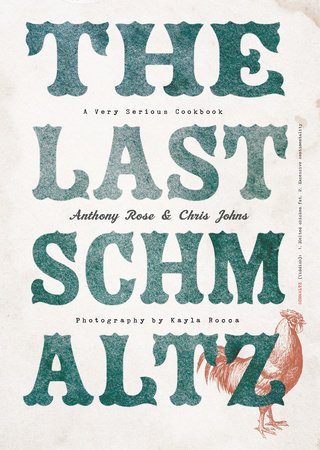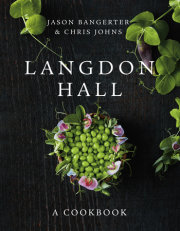TWO COOKS PARADE A WHOLE ROASTED PIG through the dining room as though it’s an old-timey duchess being transported to her rendezvous in a grand sedan chair. It’s a scene that happens quite a bit when you hang out with Anthony, actually, and it never gets old.
The timelessness of the moment, a Renaissance painting come to life, is only enhanced by the smell of woodsmoke from the massive grill, the sound of a guitar being strummed, and the abundance of animal hides strewn across therough-hewn benches.
We’re at Big Crow, the backyard barbecue joint set discreetly behind Rose and Sons. It’s Anthony’s most elemental and, in some ways, his most loved restaurant. It was also never supposed to happen.
“When we took over People’s Foods, there were still tenants living in the house upstairs,” Anthony recalls. “As they moved out we took over. The backyard where Big Crow is now was just a backyard. It was never meant to be its own restaurant, but operating a 28-seat diner is insane, so we wanted to find a way to bring more people in.”
At first, the idea was just to cook the food in Rose and Sons and move it to the backyard, but Anthony and his team quickly realized that the distance was too far and too awkward, so they moved a little grill out back to cook off of. From there, it snowballed.
The idea of creating a Southern barbecue joint was floated briefly, but Anthony had been burnt by that particular genre once before. “It’s harsh out there for a barbecue joint,” he says. “Purists are so judgy. Even when I opened Drake BBQ, which was just pulled pork and brisket, I heard the same two things: ‘Oh, they don’t serve chopped brisket in Texas’ and ‘This sauce isn’t how it’s supposed to be.’ Barbecue people are tough.”
As Big Crow’s simple wooden walls went up and the shipping container that would serve as the bar and prep kitchen was settled into place, the space took on a kind of Quebec sugar shack meets Ontario cottage vibe. Being in a backyard automatically brought up memories of being in the country and cooking outside. Clearly, the evocation of barbecue was not going away, so Anthony decided to simply draw inspiration from Canadian backyard barbecues, a style with fewer rigid rules and more room to include all kinds of traditions.
With the concept in place, the cooks were free to play with ideas; everything from peameal bacon subs and chopped brisket nachos to Cornish hens brined in pickle juice and smoked ox tongue. Even whole hogs roasted in a La Caja China, a Chinese/Cuban contraption that cooks a pig in a box beneath a pile of coals. That same China Box, as they’re known, is where tonight’s epic beast comes from. The tawny, 80-pound hog is the centerpiece for a meal Anthony is hosting for the crew behind the Boots and Hearts Music Festival.
“Of all the music events we’ve catered over the years—WayHome, Field Trip, NXNE—Boots and Hearts was always my favorite,” Anthony says. “Nobody loves music like country-music fans.”
On a big table just outside the dining room, there are a whole bed’s worth of oysters, lined up waiting to be shucked: sweet Beausoleils from New Brunswick; plump, firm French Hooters from PEI; rich Tatamagouches from Nova Scotia.
“This is my first,” announces Mark, a bulky stagehand who is about to pop his oyster cherry. He tilts the shell back, winces, and immediately chases thebivalve with a slug of beer. “How was it?” I ask. “Not bad,” he says through watering eyes. Cold, saline, and with a cucumber sweetness, they taste much better than “not bad” to me.
I polish off a few more and head inside just in time to hear Stan Dunford, the legendary venture capitalist, transportation executive, and founder of Bootsand Hearts, introduce tonight’s performer, a musician named Jesse Gold whom Stan discovered as part of the festival’s emerging artist showcase series. Decked out head to toe in black and looking a bit like a hip, bearded Hank Williams, Jesse launches into an impressive acoustic set, just a singer and aguitar, of blue-eyed country soul.
A table of fans sway to the music and sing along with every word, positioning themselves to make sure Jesse is framed in the background of their peace-sign flashing selfies.
After the final chord is strummed and the applause dies down, it’s time to eat. The cooks—Anthony included—have been busily reducing the hog to a pileof shreds and shards of crisp skin. As the plates start to arrive, people squeeze together along the long rows of benches to make room for their friends and slather gamey whipped duck fat over slices of dark, heavy bread. Crisp tortillas are dragged through creamy guacamole. Even the salad gets a turn on the grill, imbuing the romaine and treviso with a dose of smoke. Meat plates arrive, pulled pork, of course, but also thick sausage links and caramelized chicken, and with them more flavor in the form of squeeze bottles full of sauce: earthy and rich chopped mushroom salsa, grilled wild leek relish made with leeks from around Anthony’s cottage, and jalapeño cream.
In the midst of the feasting, I catch a glimpse of Anthony standing alone in aquiet corner, surveying the scene. Wiping the pork fat off my face, I excusemyself and walk over. “Happy with the party?” I ask.
“Totally,” he says. “You know, what I love about this place is that it kind ofjust came into its own. We didn’t want to push anything on the restaurant. Wewanted it to evolve into what it wanted to be. You can’t create culture.”
Copyright © 2018 by Anthony Rose and Chris Johns. All rights reserved. No part of this excerpt may be reproduced or reprinted without permission in writing from the publisher.










